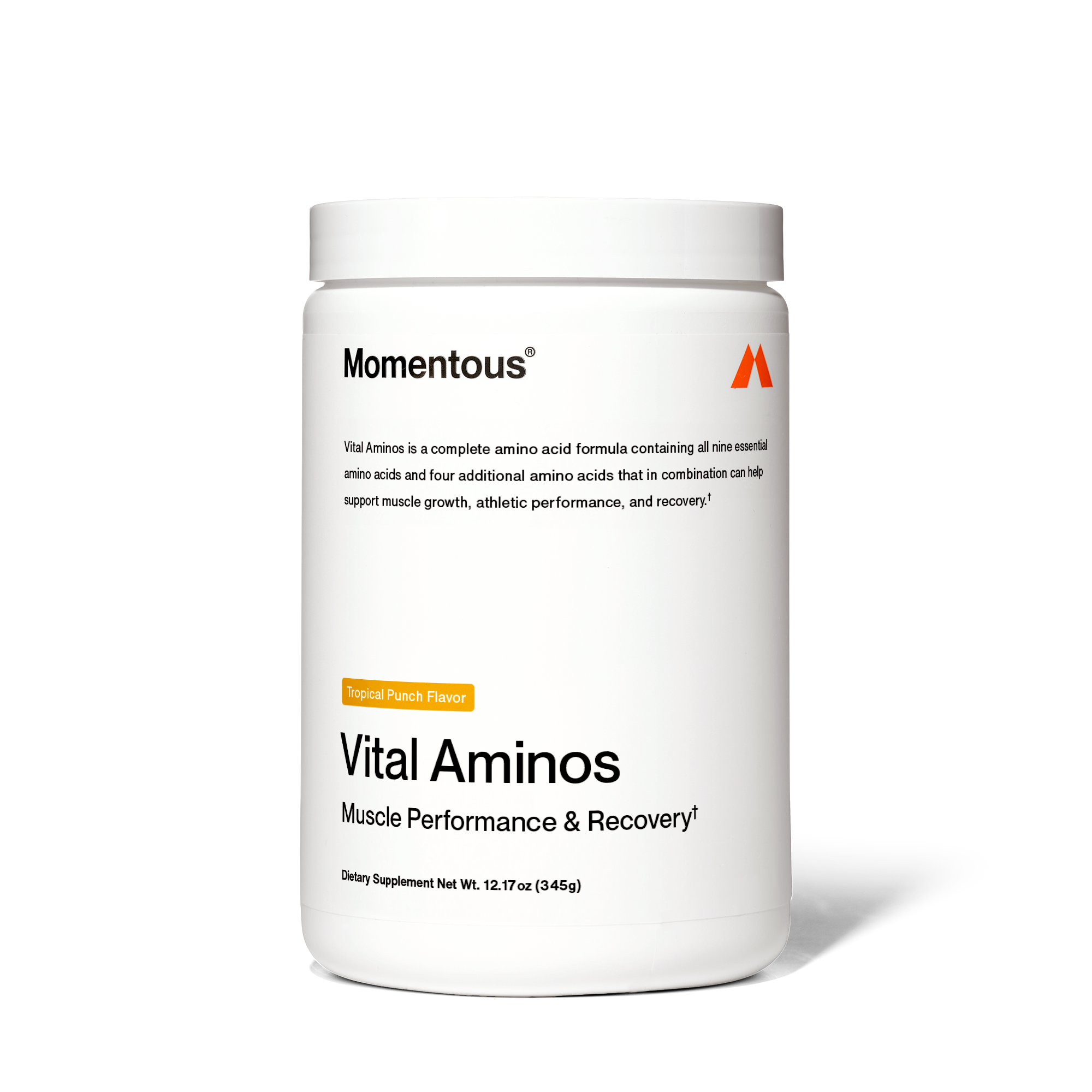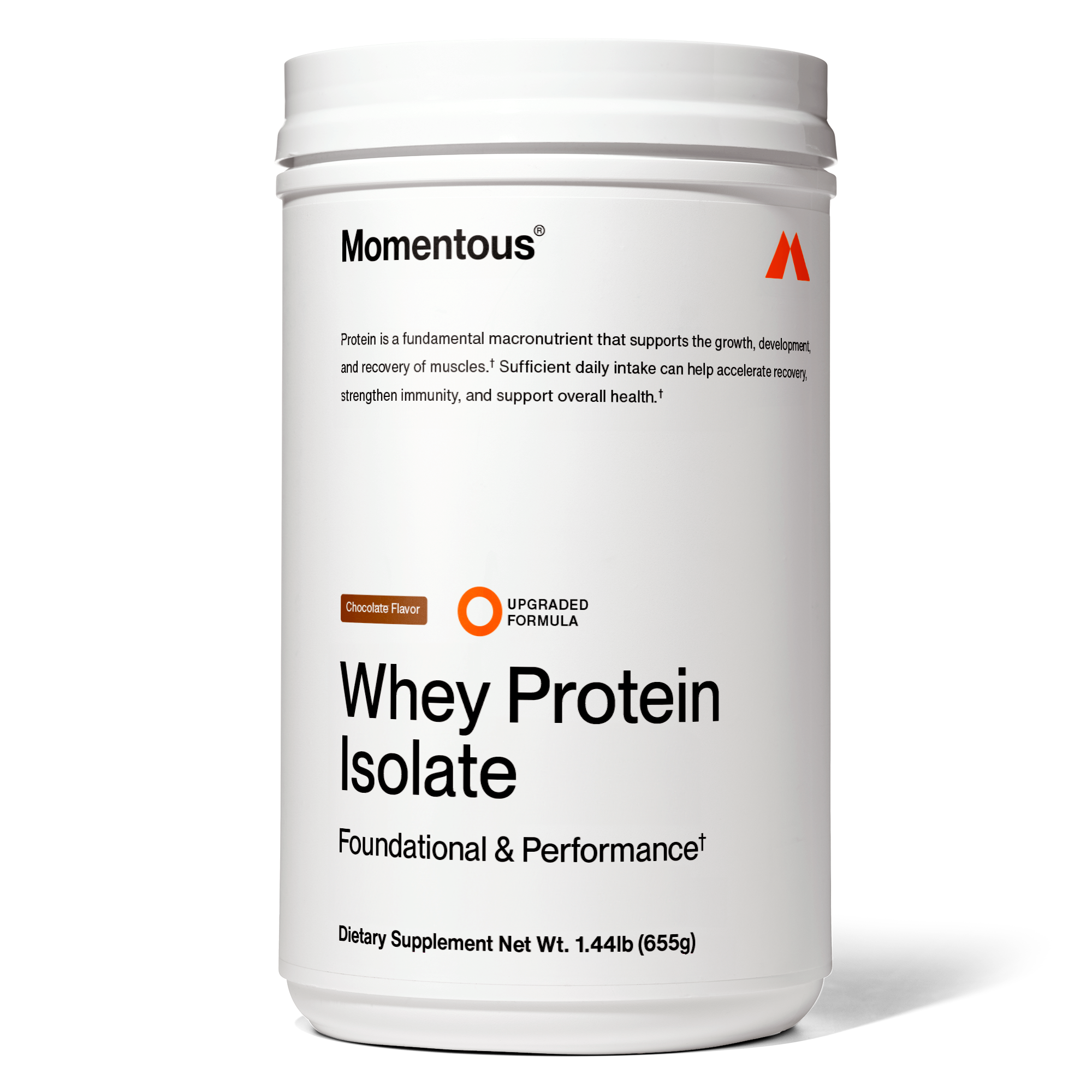Vital Aminos is a proprietary blend of 9 essential amino acids. Amino acids are the building blocks for protein construction that form muscle tissue, enzymes, hormones, and neurotransmitters.
European grass-fed whey isolate for recovery + muscle support
As you navigate the labyrinth of nutritional needs, you may wonder if you're getting enough protein. Although protein is essential for everyone, women, in particular, have unique protein requirements that often get overlooked. We're incredibly lucky to have partners like Dr. Stacy Sims, who has revolutionized exercise nutrition and performance for women. Using her knowledge and other research, let's uncover the truth about women's protein needs, their impact on health, and how you can fill the protein gap with Momentous.
Protein: Why It's More Than Just A Macro
Protein is vital for far more than just muscle building. It forms the foundation for your overall health and well-being. Lower muscle mass, often due to inadequate protein intake, is associated with a higher cardiovascular risk and is inversely related to longevity (1). Plus, muscle mass is essential in maintaining your independence as you age. It's not just about aesthetics or strength; having more muscle mass lets you enjoy the activities you love and stay out of the nursing home longer.
You don't need to be an elite athlete or bodybuilder to require a good dose of protein. As Dr. Sims' book "Roar" highlights, protein plays a significant role in various critical physiological functions (2). This includes immunity, hormone regulation, enzymatic reactions, sleep, digestion, and even ovulation. Whether you're a fitness enthusiast or simply someone looking to maintain good health, understanding the importance of protein and incorporating it effectively into your diet should be non-negotiable.
The Hormonal Influence: How Your Sex Hormones Impact Protein Needs
As Dr. Stacy Sims has said, "Women are not small men. Stop eating and training like one." Women's protein requirements are unique and heavily influenced by hormonal changes throughout their lives. Dr. Sims points out that during the follicular phase of the menstrual cycle, higher estrogen levels may increase muscle protein synthesis (3). On the other hand, during the luteal phase, rising progesterone levels may boost muscle breakdown and decrease protein synthesis (4). So, women must adjust their protein intake and timing to accommodate these hormonal shifts and optimize their muscle health and overall well-being. Sims also suggests getting at least 30 grams of protein per meal during the luteal phase, because progesterone is actually catabolic; it breaks down lean muscle mass by stealing amino acids from skeletal muscle to build the endometrial lining.
As women transition into menopause, the decline in estrogen reduces the anabolic stimulus, leading to decreased muscle protein synthesis and increased muscle breakdown (5). This change exacerbates the natural muscle loss that comes with aging, known as sarcopenia, making it even more challenging for women to maintain their muscle mass. So, consuming adequate protein becomes even more crucial to counteract these changes and maintain muscle mass during these years. Protein-rich diets can also help manage other menopausal symptoms, such as mood swings and hot flashes, by stabilizing blood sugar levels (6). Adopting a high-quality, protein-rich diet should absolutely be a priority for women during and after their transition into menopause.
Your Personal Protein Guide: How Much Do You Really Need?
While dietary guidelines, like the Recommended Dietary Allowance (RDA), suggest a baseline of 0.8 grams of protein per kilogram of body weight, this amount might not be enough for active women. Stacy highlights that active women require more protein to help their bodies recover and grow post-exercise.
-
Active Women: Dr. Sims recommends 1.7 to 2.4 grams of protein per kilogram of body weight per day for active women. This range allows for flexibility. Aim for the lower end on easier days and the higher end on heavy training days.
-
Women in Menopause Transition: For women transitioning through menopause, the protein requirement may increase to 2.2 to 2.4 grams per kilogram of body weight per day due to the hormonal changes affecting muscle protein synthesis.
Timing Your Protein Intake:
Optimizing protein synthesis requires more than just eating the right amount; timing also matters. Your body responds best to an even distribution of protein throughout the day, paired with a post-exercise protein boost.
-
Post-Exercise Protein: Dr. Sims recommends consuming protein 30-45 minutes after exercise. For pre-menopausal women, aim for 30 grams post-workout. For peri- and post-menopausal women, a higher intake of 40 grams is recommended due to increased anabolic resistance.
Protein Made Easy with Momentous
Protein's pivotal role in women's health and well-being cannot be overstated. If meeting protein needs through your diet proves challenging, Momentous offers a high-quality, great-tasting range of protein supplements, from Whey and Plant-based, to our recently launched Vital Aminos. These versatile products are designed to fit seamlessly into any lifestyle or nutritional preference, making it easier than ever for women to meet their protein needs. It's time to embrace the importance of protein and feel the difference in your health and performance.
----
(1) Nomura, K., Eto, M., Ogawa, S., Kojima, T., Iijima, K., Nakamura, T., Araki, A., Ouchi, Y., & Akishita, M. (2020). Association between low muscle mass and metabolic syndrome in elderly Japanese women. PloS One, 15(12), e0243242.
(2) Sims, S., & Yeager, S. (2016). Roar. Rodale Press.
(3) Why women need to prioritize protein. (n.d.). Drstacysims.com. Retrieved May 2, 2023, from https://www.drstacysims.com/blog/Why-Women-Need-to-Prioritize-Protein
(4) Sarwar, R., Niclos, B. B., & Rutherford, O. M. (1996). Changes in muscle strength, relaxation rate and fatiguability during the human menstrual cycle. The Journal of Physiology, 493 ( Pt 1), 267–272.
(5) Cho, E.-J., Choi, Y., Jung, S.-J., & Kwak, H.-B. (2022). Role of exercise in estrogen deficiency-induced sarcopenia. Journal of Exercise Rehabilitation, 18(1), 2–9.
(6) Whiteley, J., DiBonaventura, M. D., Wagner, J.-S., Alvir, J., & Shah, S. (2013). The impact of menopausal symptoms on quality of life, productivity, and economic outcomes. Journal of Women's Health (2002), 22(11), 983–990.














